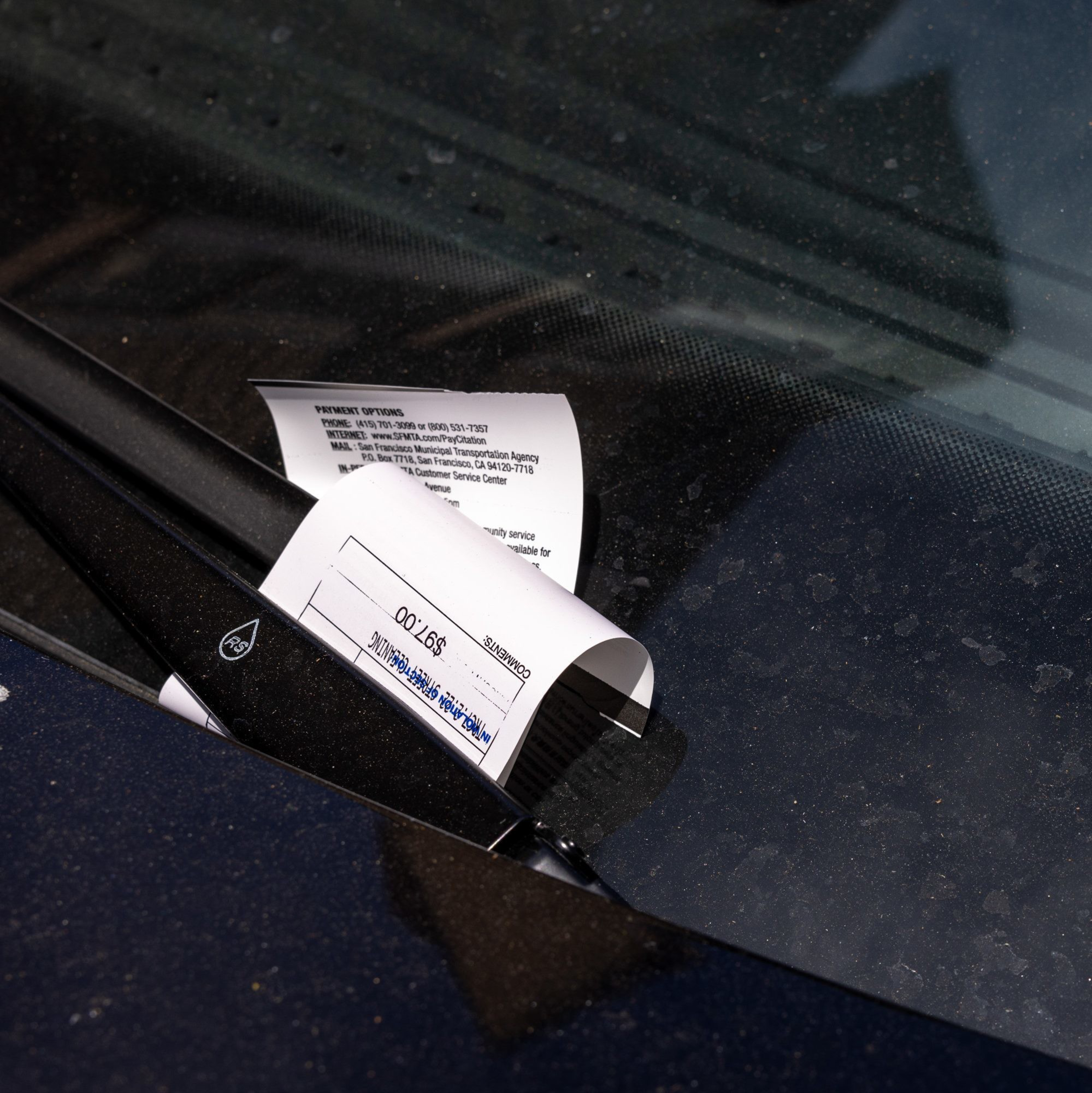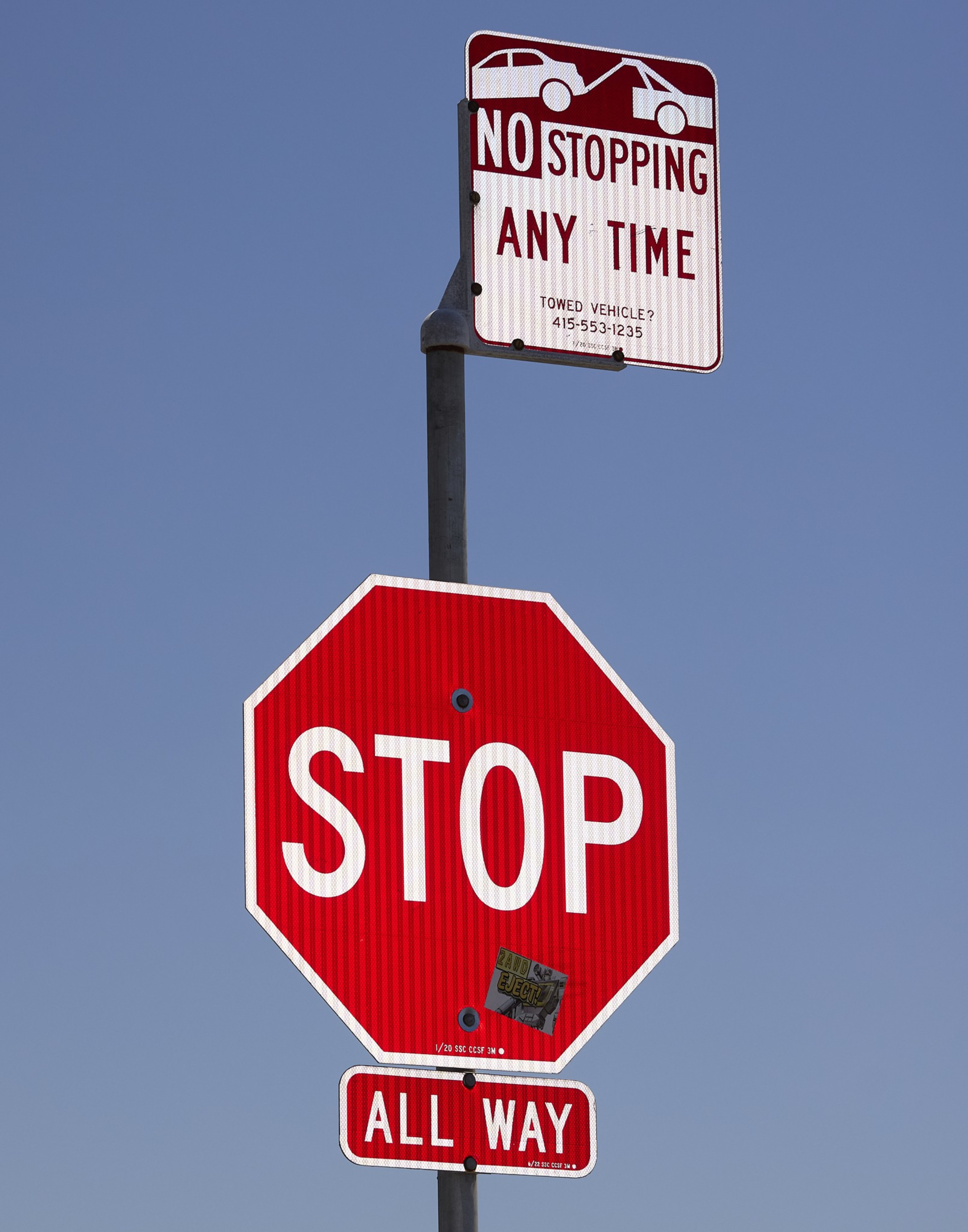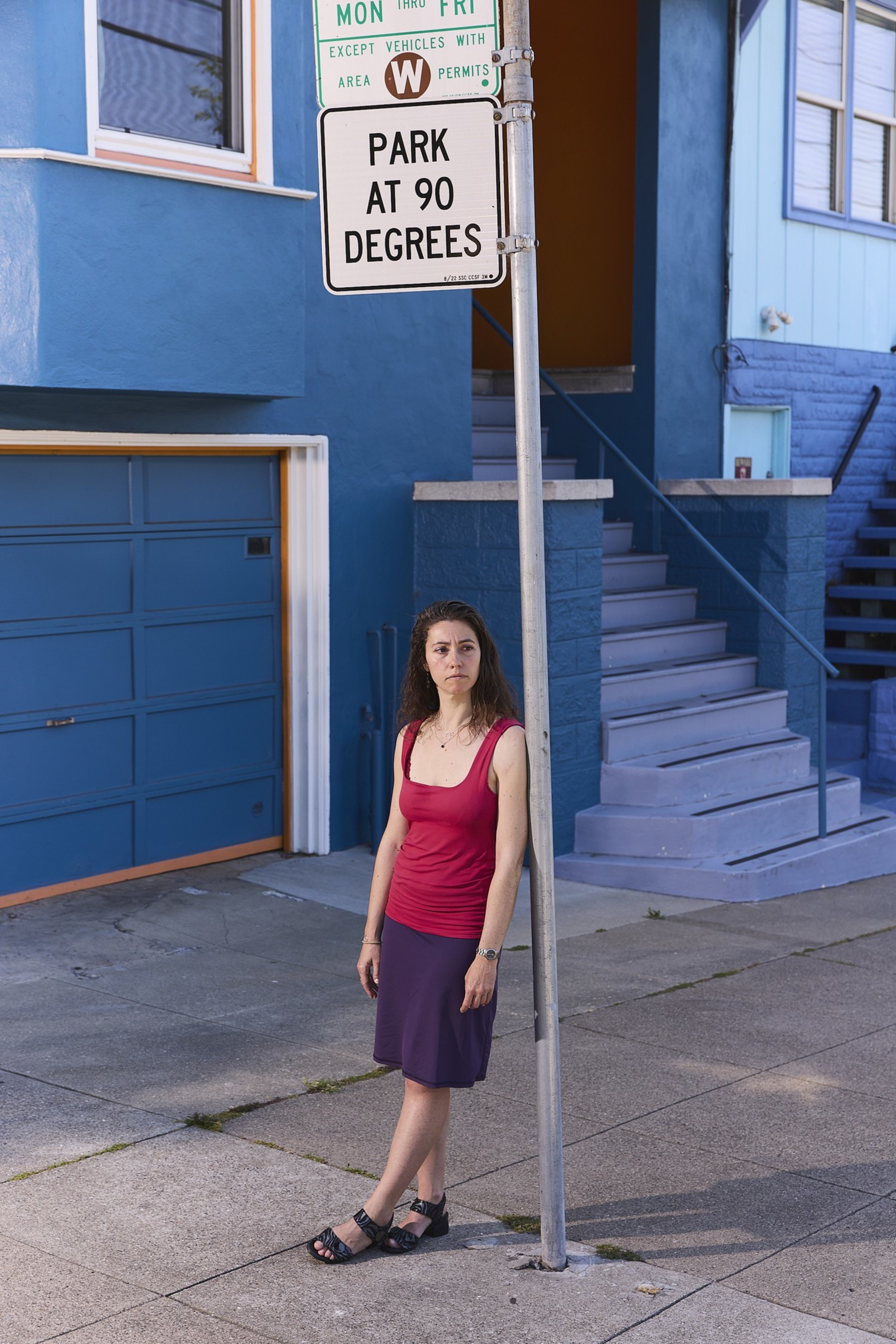Cary Fulbright and the parking cops on his Pacific Heights block have had an understanding for 35 years: If the street sweeper has already passed his house, he won’t get a ticket — even if the two-hour enforcement window isn’t over.
But on April 7, the arrangement appeared to die. Despite double-checking with an enforcer that he was in the clear, Fulbright received a $97 ticket in the mail.
“I asked, ‘Can I park? Will I get ticketed?’ And he said, ‘You can park. You won’t get ticketed,’” Fulbright said. He got out of his car, took a picture of the three-wheel enforcement vehicles, then walked into his house.

“According to the Ring doorbell I opened the door at 10:11 a.m.,” he wrote in a post (opens in new tab) on Nextdoor. “Somehow the parking ticket was issued at 10:12 a.m.” The Standard reviewed Fulbright’s photo of the parking cops, time-stamped 10:09. A spokesperson for the San Francisco Municipal Transportation Agency said the street sweeper had not actually passed yet.
Fulbright, a retired tech marketer, is not alone in his frustration. San Franciscans have been complaining online for months about increased parking enforcement and what they feel is overly-exacting ticketing.
Last April, the SFMTA announced that its enforcement team was fully staffed for the first time since the pandemic. Thus began an intense district-by-district crackdown that has netted the agency more than $126 million in parking ticket revenue since last April, a $16 million increase from the previous year. (After publication, an SFMTA spokesperson disputed this figure, saying the increase was closer to $9 million after accounting for unpaid and dismissed tickets.)
Despite the crackdown, overall ticketing rates aren’t back to pre-pandemic levels. An SFMTA spokesperson attributed this in part to an increase in rideshare use.
But public data shows the agency has been issuing far more tickets for a few specific violations, including parking on sidewalks or in bike lanes and blocking crosswalks. Citations for parking on the sidewalk jumped more than 40% between the first three months of 2023 and the first three months of 2024 and were up 3% in the first three months of this year.



The number of street cleaning tickets, like the one issued to Fulbright, has remained fairly constant since 2019, with the exception of 2020, when all ticket numbers plummeted.
The increased in-your-face parking enforcement comes at a time when the city is also closing roads like the Great Highway to cars, devoting more street space to bike lanes and traffic-calming features, and installing cameras to catch speeders. It all adds up to a feeling among some motorists that SFMTA is bent on driving them to extinction.
Fulbright, for one, said he thinks SFMTA is engaged in a misguided “war on cars.”
“I have an electric car, so I’m not a bad guy,” Fulbright said. “Although it’s a Tesla, so maybe I am a bad guy, although I wasn’t when I bought it.”
Agency spokesperson Parisa Safarzadeh said SFMTA is not waging war on vehicles, noting that San Francisco has the highest car density of any major U.S. city.
“A lot of residents, including many who own cars, as well as businesses are frustrated by others not following parking rules,” Safarzadeh wrote in a statement. “Parking enforcement isn’t unique to San Francisco — it’s a core service every major metropolitan city enforces.”
Lydia Tomasini, a tech worker who lives on a steep block in Potrero Hill, has been feeling the heat too. For four years, she’s been parking on her street, perpendicular to traffic, without any issues.
“It was only at the end of March that they became aggressive,” she said.

Tomasini posted (opens in new tab) to Nextdoor a picture of an $89 ticket she got March 25. A week later, she got another one. A neighbor replied that she’d also been parking perpendicular to the curb for 20 years without trouble.
Tomasini said she has been following the example set by other motorists since she moved to the neighborhood in 2021. Hers is the only steep block in the area without perpendicular parking signs, she said.
She contested the ticket and contacted the office of her supervisor, Shamann Walton. An aide told her they had reached out to SFMTA to install proper signage on her street. At SFMTA’s May 2 engineering public hearing (opens in new tab), staff began the process of formalizing perpendicular parking, and confirmed that parking cops have stopped citing residents for perpendicular parking on the block. A SFMTA spokesperson later confirmed the agency was dismissing the citations.
Inner Richmond residents last March received a wave of tickets for parking in their own driveways; the reason cited was that they were partially blocking the sidewalk. Fulbright said he has seen an onslaught of parking cavalry in nearby Pacific Heights — as many as seven cops at a time — charging through the streets.
SFMTA isn’t the only entity seeing a revenue opportunity in stepped-up ticketing. Minhao Zhang and Lindsey Liu, a couple who live in the Mission, are fundraising for an app (opens in new tab) that reminds people to move their cars. After getting laid off from tech jobs, Zhang and Liu are working on the app full time.

The couple put up flyers last week with QR codes to their Kickstarter page and a parody “SFNTA” logo, which means “San Francisco No Tickets Again,” Zhang explained.
Liu said it was a coincidence that they started working on the app during the parking crackdown, but the uptick in ticketing is “definitely an inspiration for our future activities.”
They’re not the only ones. After racking up $900 in parking tickets near their NoPa home, married couple Pablo Felgueres and MaryLouise Howell built their own parking app. Two years later, the app (opens in new tab) has around 250 members who pay $14 a year for customized reminders.
“I spent a weekend building this thing for me, and it has turned out to help hundreds of people,” Felgueres said.
Not everybody is upset about the crackdown. Andy, a chemist from Potrero Hill who asked to withhold his last name for privacy reasons, thinks SFMTA hasn’t gone far enough.
“People pushing strollers and in wheelchairs shouldn’t have to zigzag down the sidewalk,” he said, adding that he regularly sees cars parked on the sidewalk in his neighborhood. “The city let this get out of hand way too long ago, and now they can’t get a reel on it.”
Andy has been calling 311 to report cars on the sidewalk for years, but a recent parking infraction drove him to previously unknown levels of irritation. On April 22, a 19 and a 48 bus faced off on 26th Street, unable to pass each other because of a Jeep parked in a tow-away spot. The bus drivers got out of their vehicles to talk and figure out how to pass, photos reviewed by The Standard show, and Andy’s girlfriend, who was riding one of the buses, missed her Caltrain. He was mad.

“It’s fucking war now,” he said. Then he filed five 311 reports before blasting tweets (opens in new tab) at SFMTA. As of this week, the car is still there, he said. (The car’s registered owner did not respond to an interview request.)
While he’s glad that the agency is issuing more parking tickets and has noticed more tickets for blocking crosswalks, he said the enforcement efforts could be intensified.
“They’re trying to save money,” Andy said. “I could walk down the sidewalk for 10 minutes and issue $1,000 in tickets.”
Elsewhere in the city, the agency has tried to do just that, a new lawsuit alleges. Former SFMTA employee Elias Georgopoulos alleged enforcement teams intentionally blitz low-income neighborhoods like the Excelsior, Mission, and Bayview-Hunters Point because residents “don’t know how to fight City Hall.” SFMTA declined to comment on the pending litigation but provided a statement saying it takes equity “very seriously.” Most publicly available ticket records are not tagged with a neighborhood, but among those that are, the Financial District, Mission, and Tenderloin are the most-ticketed areas, in that order.
In the Excelsior, a 20-year resident who also asked to withhold her name said she was pulling out of her driveway March 21 when she paused to look at a maps app on her phone. She estimates she was blocking the sidewalk for no more than three minutes when a meter maid passed by and snapped a photo of her license plate. The resident said she backed out of her driveway right away to show she was in the car, hoping the parking cop would take mercy.
“I got home that night and saw she gave me a ticket,” the resident said. “I was like, ‘What the hell?’”
The resident’s two attempts to appeal the ticket have proved unsuccessful. She said she’ll probably give up and pay the fine, adding that the appeal process seems designed to discourage resistance.


SFMTA spokesperson Michael Roccaforte provided data showing that about a third of appealed tickets have been dismissed over the last three years. He disputed the Excelsior resident’s account, saying the SFMTA was responding to a neighbor’s complaint.
Tom Ellis, a lighting technician who lives in Noe Valley, said he recently got his first parking ticket for blocking a neighbor’s driveway by “a millimeter.” The cost? $108.
“These fines will only impact those who don’t have the privilege of access to a garage,” Ellis said.
Roccaforte said the SFMTA offers discounts for people experiencing poverty or homelessness, as well as payment plans and an option to do community service instead of paying a fine.
Though he’s already paid off his ticket, Pacific Heights resident Fulbright said it still stings. “When you’re on retirement income, that’s a lot of money for something that shouldn’t have happened.”
But even more than his personal loss, Fulbright is concerned about what he sees as a betrayal by SFMTA.
“This is contrary to their well-established pattern of behavior for decades … that car owners have come to rely on to move their cars in time,” he said via email. “To me, it demonstrates a new level of aggressiveness, which is consistent with my opinion that they are trying to balance the books on the backs of residential car owners.”
